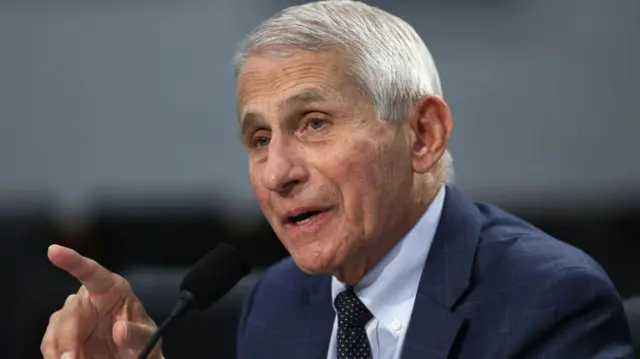Dr. Anthony Fauci, now 84 years old, remains a leading figure in public health as the former director of the National Institute of Allergy and Infectious Diseases (NIAID) and a key advisor during the COVID-19 pandemic. With a career spanning over five decades, Fauci’s contributions to medical science and his leadership during global health crises have made him one of the most respected medical professionals worldwide. His reported net worth is estimated at $15 million in 2025, reflecting his lifetime of service and success in public health.
However, Fauci’s prominent role during the pandemic and his advocacy for vaccines, masks, and public health measures also made him a target of political polarization. Threats to his safety escalated, leading to the necessity of a federal security detail. The decision to provide him with protection underscores the increasingly volatile environment surrounding public health officials in modern times.
Why Was a Security Detail Assigned to Dr. Fauci?
In 2020, as Fauci became the face of the U.S. government’s response to the COVID-19 pandemic, his visibility skyrocketed. While many praised his efforts, others criticized or vilified him due to political and ideological divisions over pandemic-related policies. As public discourse intensified, Fauci began receiving threats against his life, family, and safety.
The U.S. Department of Health and Human Services (HHS) determined that the level of danger warranted a federal security detail. Fauci’s position as a top government official handling a highly contentious health crisis placed him at significant personal risk, making protection a priority.
What Does Fauci’s Security Detail Entail?
Fauci’s security detail is managed by the HHS Office of Inspector General, with collaboration from other federal agencies when needed. It involves round-the-clock protection, including at his workplace, home, and during travel. Security measures also extend to his family members, ensuring their safety from potential threats.
Details of his protection are not fully disclosed for security reasons. However, it is known that his security team includes specially trained federal officers, advanced surveillance measures, and strategies to mitigate risks during public appearances or media engagements.
How Have Threats Against Fauci Impacted His Life and Work?
The threats directed at Fauci have profoundly affected his personal and professional life. He has publicly acknowledged the stress and concern these threats have caused, especially regarding the safety of his family. Despite these challenges, Fauci has remained committed to his work, continuing to advocate for evidence-based public health policies.
In interviews, Fauci has expressed disappointment over the politicization of science and the hostility faced by public health officials. He noted that threats against him reflect a broader issue of mistrust in institutions and the weaponization of misinformation.
What Broader Trends Do These Threats Highlight?
The need for Fauci’s security detail highlights a troubling trend: the increasing hostility and violence faced by public health officials and scientists. During the COVID-19 pandemic, many health professionals around the world reported receiving threats, harassment, and intimidation for implementing or advocating for public health measures.
This trend underscores the challenges of navigating the intersection of science, politics, and public opinion. It also raises questions about how societies can better support and protect those working on behalf of public health.
Are Other Public Health Officials Facing Similar Risks?
Fauci is not alone in requiring heightened security. During the pandemic, several public health officials, including Dr. Rochelle Walensky (former CDC Director) and local health department leaders, reported receiving threats. Some officials resigned from their positions due to the hostility and pressure they faced.
The politicization of health measures, such as lockdowns, vaccine mandates, and mask requirements, has created a contentious environment for those in leadership roles. The backlash against these measures has placed many officials in the crosshairs of public frustration, leading to an urgent need for increased security.
What Has Fauci Said About His Security Detail?
Fauci has spoken candidly about the necessity of his security detail, acknowledging that it is a sad reflection of the times. In interviews, he has expressed disbelief that advocating for public health could lead to such extreme hostility. “It’s disheartening,” he once said, “that people who dedicate their lives to saving others need to worry about their own safety.”
Despite the risks, Fauci has emphasized his commitment to science and public health. His resilience in the face of adversity has inspired many, serving as a reminder of the importance of standing firm in the pursuit of truth and evidence-based solutions.
How Has the Security Detail Evolved Over Time?
Fauci’s security detail has adapted over the years to address changing threat levels. Initially implemented during the height of the COVID-19 pandemic, the detail has been extended as threats persisted beyond the pandemic.
In recent years, security measures have expanded to include more advanced monitoring and coordination with local law enforcement agencies. These enhancements reflect the ongoing risks faced by Fauci and the importance of proactive protection.
What Legacy Does Fauci Leave Amid These Challenges?
As Fauci transitions into retirement and focuses on mentoring and advisory roles, his legacy extends far beyond the challenges he faced during the pandemic. His decades-long career has been defined by groundbreaking contributions to HIV/AIDS research, infectious disease control, and public health policy.
Fauci’s resilience in the face of hostility serves as a powerful example of leadership under pressure. He has inspired future generations of scientists and public health advocates to remain steadfast in their commitment to truth, even in the face of adversity.
Final Thoughts: What Does Fauci’s Story Teach Us About Public Service?
Dr. Anthony Fauci’s experience underscores the complexities of public service in a polarized world. The need for a security detail highlights the sacrifices and risks associated with leadership during challenging times.
As society reflects on the lessons of the pandemic, it is crucial to recognize and support the individuals who dedicate their lives to protecting public health. Fauci’s story is one of perseverance, resilience, and an unwavering commitment to science, leaving an indelible mark on global health and the fight against infectious diseases.

:max_bytes(150000):strip_icc():focal(1033x410:1035x412)/Jesse-Lee-Soffer-Tracy-Spiridakos-relationship-all-about-Chicago-P.D.-romance-01-fa6fedeb8aff40aeb591b6d5885ca3cf.jpg)
